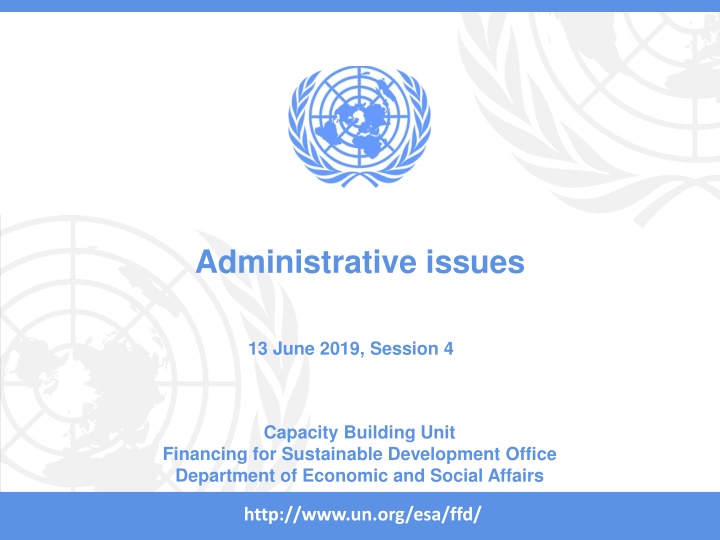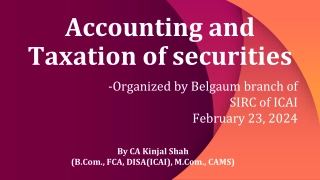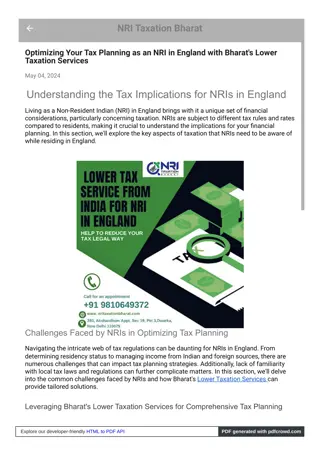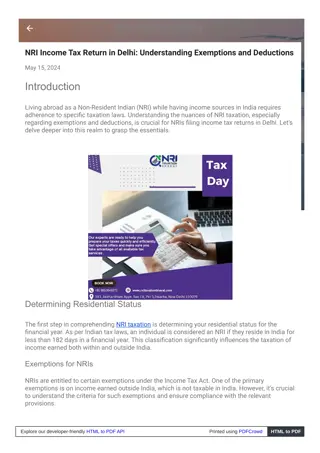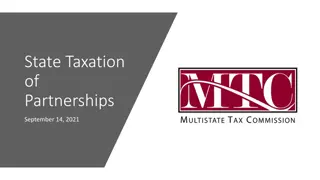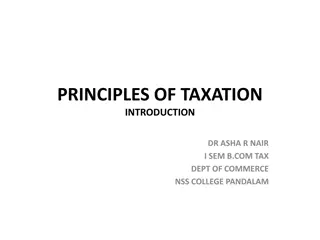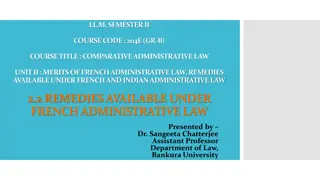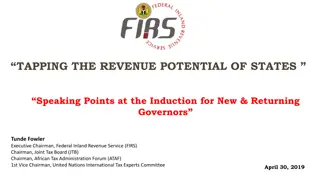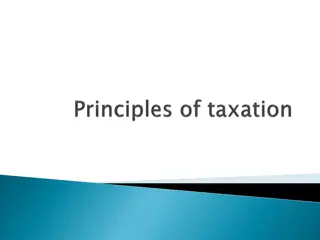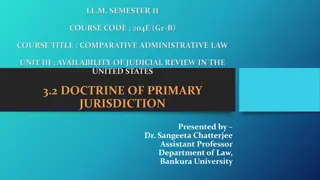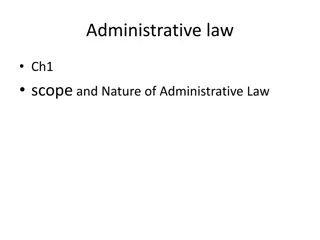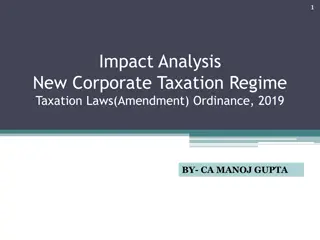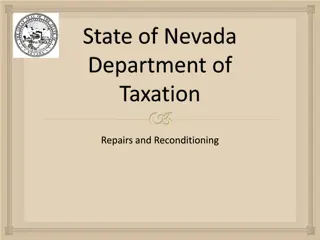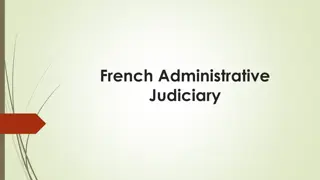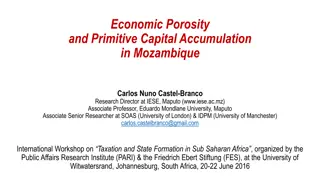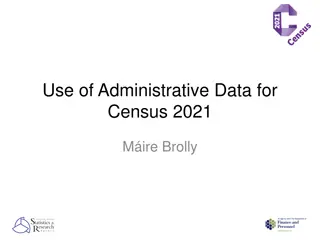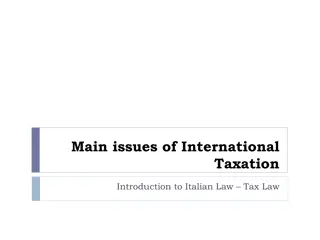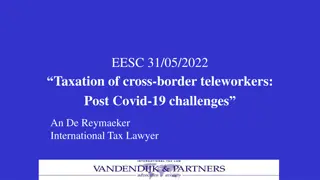Administrative Issues in Taxation for Sustainable Development
This content discusses the administration of provisions in tax treaties, disclosure of information, and reporting requirements for residents and non-residents. It emphasizes the unique situations of each country and the importance of effective tax administration to prevent base erosion.
Download Presentation

Please find below an Image/Link to download the presentation.
The content on the website is provided AS IS for your information and personal use only. It may not be sold, licensed, or shared on other websites without obtaining consent from the author.If you encounter any issues during the download, it is possible that the publisher has removed the file from their server.
You are allowed to download the files provided on this website for personal or commercial use, subject to the condition that they are used lawfully. All files are the property of their respective owners.
The content on the website is provided AS IS for your information and personal use only. It may not be sold, licensed, or shared on other websites without obtaining consent from the author.
E N D
Presentation Transcript
Administrative issues 13 June 2019, Session 4 Capacity Building Unit Financing for Sustainable Development Office Department of Economic and Social Affairs http://www.un.org/esa/ffd/
Overview Administration of provisions of domestic law with respect to services to prevent base erosion Disclosure and information reporting requirements Audit and verification activities to prevent base erosion Administration of provisions of tax treaties with respect to services to prevent base erosion 2
Overview Each country s situation is unique and depends on its domestic law, tax treaties and its tax administration Manual is general and must be adapted to each country s needs Manual focuses on non-residents because risks of base erosion are greater Tax administration issues are greater for net basis taxation of non-residents than gross basis 3
Disclosure and Information Reporting: Residents Three main sources: The resident taxpayer The tax authorities of other countries with which your country has tax treaties or TIEAs Public information Information about foreign revenue and expenses, the amount of foreign tax paid Information about related-party services Can be provided in tax return or separate information return 4
Disclosure and Information Reporting: Residents Five main sources: The non-resident service provider A local representative or agent of the non-resident Persons making payments to the non-resident The tax authorities of other countries with which your country has tax treaties or TIEAs, including country- by-country reports Public information Country must have authority under domestic law to obtain information 5
Disclosure and Information Reporting: Non-residents Identification of non-resident service providers from: Tax returns Visa requirements Business registration requirements Applications for taxpayer identification numbers Payers Public information (e.g., entertainers) Sometimes difficult or impossible to identify non-resident service providers; therefore, necessary to impose withholding obligation on resident payers 6
Disclosure and Information Reporting: Non-residents Amount of income derived Non-residents should be required to provide information in tax return and to maintain financial books and records Payers should be required to provide information about payments to non-residents Use of prescribed forms for this purpose Information from foreign tax authorities 7
Disclosure and Information Reporting: Non-residents Related-party services payments Necessary for the application of your country s transfer pricing rules Require residents or non-residents with PE or fixed base to provide information about payments for services to related non- residents Use prescribed form If information is provided for transfer pricing purposes, ensure information is available to tax officials dealing with withholding tax 8
Disclosure and Information Reporting: Non-residents Related-party payments for services Could be limited to deductible payments Should also apply to payments to related individual and non-corporate entities Necessary for new Article 12A(7) on fees for technical services (provision similar to Arts. 11(6) and 12(6)) 9
Disclosure and Information Reporting: Non-residents Related-party payments for services Information required: Name and address of non-resident Legal relationship between non-resident and payer Date and amount of payment Type of services Location where services performed Whether non-resident has a PE or fixed base in your country Number of days non-resident or its employees spend in your country 10
Disclosure and Information Reporting: Non-residents Prescribed forms for payments for services by non-residents Requirement to file a form for each payment or for payments made on a monthly, quarterly or annual basis Penalties for failure to file 11
BEPS Transfer Documentation Requirements New Chapter V of OECD Transfer Pricing Guidelines Large multinationals required to provide master file with information of their global business operations and transfer pricing policies Master file intended to be available to all relevant tax administrations Local file with detailed transfer pricing information available to each country 12
Country-by-Country Reporting Large multinationals (consolidated group revenue of 750 million Euros) must file an annual report in the country of parent s residence containing information about each jurisdiction in which the multinational group does business Required information includes: Revenue Profit before tax Tax paid and accrued 13
Country-by-Country Reporting Required information includes (continued): Number of employees Stated capital Retained earnings Tangible assets Group entities doing business in country and nature of business Requires domestic legislation Action 13 contains an implementation package with draft legislation 14
Country-by-Country Reporting Intended to be implemented for fiscal years beginning on or after 1 January 2016 Your country s status? C-by-C reports to be exchanged automatically pursuant to exchange of information provisions in bilateral treaties, the Multilateral Agreement on Mutual Assistance or TIEAs Information concerning related party base eroding payments of interest, royalties and services is not required Information on an entity by entity basis is not required 15
Mandatory Disclosure Rules BEPS Action 12 recommends adoption of mandatory disclosure rules for aggressive tax transactions Intended to allow tax administrations and tax policy makers to respond quickly to abusive transactions through risk assessment, audit and legislative changes BEPS Action 12 Final Report provides principles for designing domestic legislation for mandatory disclosure rules 16
Audit and Verification Assumes that country taxes all income from services derived by non-residents (if country doesn t tax, audit is less necessary) Same audit and verification techniques that apply generally Requires assessment of risks of non- compliance and allocation of enforcement resources to greatest risks Costs of audit depend on complexity of provisions of domestic law with respect to services 17
Audit and Verification: Residents Audit and verification of residents earning income from foreign services is the same as for residents earning foreign source income generally 18
Audit and Verification: Non-residents Audit and verification of non-residents taxed on a net basis Usually activities can focus on books and records for the non-resident s PE or fixed base If non-resident is subject to interim withholding, information provided by withholding agents can be used and cross- checked against information provided in tax return Withholding agents also need to be audited 19
Audit and Verification: Non-residents Audit and verification of non-residents taxed on a gross final withholding basis Only issue is whether the correct amount was withheld Information filed by withholding agent can be checked against agent s books and records, tax returns, etc. Penalties imposed on withholding agents will usually ensure their compliance Special attention to related party transactions 20
Audit and Verification: Non-residents Compliance burden on withholding agents needs to be balanced against your country s need to enforce the tax on non-residents effectively If waivers from the obligation to withhold are permitted, it will be necessary to audit the waiver program to ensure it is operating properly 21
Administration of Tax Treaties to Prevent Base Erosion For information on the administration of tax treaties generally, see UN Handbook on the Administration of Tax Treaties (2013) Few rules in tax treaties concerning administrative issues; therefore, rules must be found in domestic law Developing countries should consider adoption of uniform rules, including procedural rules, for the application of tax treaties 22
Administration of Tax Treaties to Prevent Base Erosion Determination of treaty residence Is non-resident service provider a resident of a country with which your country has a tax treaty? Which country? Residence is determined under Art. 4 of the relevant treaty by reference to the law of the other country Certificate of residence from tax authorities of the other country 23
Administration of Tax Treaties to Prevent Base Erosion Certificates may also be required or used for beneficial owner requirement in Art. 12A Certificates can be formalized through mutual agreements and use of forms Compliance costs if certificate is required for every payment to non-resident 24
Administration of Tax Treaties to Prevent Base Erosion Can withholding agents rely on non-resident s address or do they have to obtain residence certificate? More efficient to rely on address But susceptible to abuse Withholding agents are likely to withhold higher amount required by domestic law if residence certificate is necessary Note: some treaties may have limitation-on- benefits (anti-treaty shopping) provisions 25
Administration of Tax Treaties to Prevent Base Erosion Dual residence situations Art. 4 provides tie-breaker rules to assign residence to one country Note new tie-breaker rule in Art. 4(3) Some treaties may resolve dual residence through the mutual agreement procedure Dual-resident entities often used for tax avoidance purposes 26
Administration of Tax Treaties to Prevent Base Erosion Determining the applicable provision of the treaty Several provisions applicable to services; therefore, necessary to determine: 1. Whether the income is from services 2. What type of services? 3. In what legal capacity are the services provided? (employee or independent contractor) 27
Administration of Tax Treaties to Prevent Base Erosion Qualification for treaty benefits Are the conditions for the application of the relevant treaty provision met? Is the non-resident a person? Is the non-resident a resident of the country? Is the non-resident the beneficial owner? Does the non-resident have a PE or fixed base in the country? 28
Administration of Tax Treaties to Prevent Base Erosion Are the conditions for the application of the relevant treaty provision met? Is non-resident present in your country for minimum time? Are the services performed in your country? Does any LOB provision apply? Your tax authorities must determine if these requirements are satisfied 29
Administration of Tax Treaties to Prevent Base Erosion Where non-resident is taxable under Art. 7 or 14, necessary to determine non-resident s income attributable to PE or fixed base Income determined on the basis of tax return and supporting books and records If no tax return filed, difficult to determine net income, but non-resident will likely file to get treaty benefits 30
Administration of Tax Treaties to Prevent Base Erosion Rules for computing income are found in domestic law, subject to rules in Art. 7 Deductions cannot be denied on basis that expenses were incurred outside country No deductions for amounts charged by head office to PE or by PE to head office If customary, determination of profits by apportionment is acceptable Profits must be determined consistently 31
Administration of Tax Treaties to Prevent Base Erosion Art. 9 and transfer pricing guidelines apply to related-party transactions Application of transfer pricing rules is very difficult Countries should have robust domestic transfer pricing rules and a specialized transfer pricing unit in the tax administration 32
Administration of Tax Treaties to Prevent Base Erosion Collection of tax For non-residents taxed on a net basis Interim withholding Payment of tax by installments Assistance in collection from other country under Art. 27 33
Administration of Tax Treaties to Prevent Base Erosion Collection of tax For non-residents taxed by final withholding tax Treaties don t specify how withholding taxes should be applied No limit on source country taxation of services, except fees for technical services under Art. 12A Imposed on residents and non-residents with a PE or fixed base so withholding can be enforced 34
Administration of Tax Treaties to Prevent Base Erosion Penalties imposed on withholding agents for failure to withhold and remit Interest and financial penalties Joint liability for amount of tax Denial of deduction if no withholding Some countries require withholding only for deductible payments 35
Administration of Tax Treaties to Prevent Base Erosion Method of withholding is a matter of domestic law Interim or final If interim, non-resident must be allowed to file return and claim a refund If final, no return and no refund If domestic rate is higher than treaty rate, in order to meet treaty obligations, your country must have a procedure for non-residents to claim refund 36
Administration of Tax Treaties to Prevent Base Erosion Withholding agents may be unwilling to risk withholding at treaty rate unless special provisions are in place Possible to allow agents to apply for waiver of obligation to withhold or for permission to withhold at treaty rate Some countries have statutory provision allowing withholding at treaty rate Tax authorities must administer such provisions 37
Administration of Tax Treaties to Prevent Base Erosion Balancing between the need to deliver treaty benefits efficiently and ensuring that benefits are justified Problems of administration are exacerbated as treaty network grows and rates of withholding tax vary Assistance in collection of withholding taxes under Art. 27 however, included in few treaties 38
Thank you TaxffdCapDev@un.org 39 http://www.un.org/esa/ffd/
